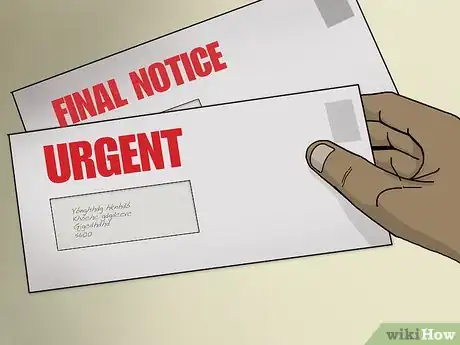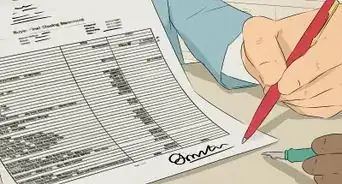This article was co-authored by Carla Toebe. Carla Toebe is a licensed Real Estate Broker in Richland, Washington. She has been an active real estate broker since 2005, and founded the real estate agency CT Realty LLC in 2013. She graduated from Washington State University with a BA in Business Administration and Management Information Systems.
There are 15 references cited in this article, which can be found at the bottom of the page.
This article has been viewed 11,861 times.
Buying a house is a big step, and if you're ready to make that step, congratulations! Begin by figuring out what you can spend and working on perfecting your credit. Good credit will help you get approved for a mortgage loan with a good interest rate. Apply for pre-approval so you know what you can spend, and also take a hard look at your current home, decluttering so you can get ready for your big move.
Steps
Budgeting for a House
-
1Take a hard look at your budget. Start by looking at what you pay in rent now. That's a good starting place to figure out what you can pay on a mortgage. However, you also must consider what you can get approved for. Generally, you'll only get approval for a monthly mortgage payment that's 30% to 35% of your pretax income.[1]
- So if you're making $3,500 a month, you can be approved for a payment that's $1,050 to $1,225. If you have more than one borrower, both incomes count towards the total.
-
2Remember your payment is more than the mortgage. When you have a house, your monthly payment consists of more than just the mortgage payment. You pay property taxes, which can vary widely based on where you live. You'll also pay homeowners insurance.[2]
- If you put less than 20% down on your house, you will likely need to buy private mortgage insurance (PMI). This protects the lender if you default on the house. Once you pay 20% of the mortgage or you have 20% equity in the home, you no longer need to pay this.
- You may also need to budget for items like homeowner's association fees and maintenance on the house. You may also need special insurance, such as flood insurance, based on the location of the home.
- Some properties may be subject to special fees or assessments from your county, such as an irrigation assessment. These can add hundreds of dollars to fees each year and may be included in your mortgage.
Advertisement -
3Use a mortgage calculator. You can find a wide variety of mortgage calculators online, which can help you navigate your budget. However, you'll need relevant numbers for your area, such as property tax information and the basic cost of homeowners insurance. Try one like https://www.mortgagecalculator.org/. A mortgage calculator tells you how much you can spend on a house for the monthly payment you want.
-
4Save for the down payment. If you're a first time home buyer or a veteran, you may be able to get a special loan that doesn't require a down payment. However, you generally want a down payment of 20 percent of the price of the house. Even if your loan doesn't require a down payment, it's a good idea to make as big of a down payment as you can, as the more you pay upfront, the less you'll pay over the life of the loan.[3]
- Sometimes, you can have a lower down payment, but then you must purchase private mortgage insurance (PMI) to get approved.
Working on Your Credit
-
1Find out your credit score. Your credit score is very important when buying a house. It affects whether you can be approved at all for a mortgage, and if you do get approved, it determines your interest rate. Your interest rate determines how much you'll pay each month, as well as how much interest you'll pay over the life of your mortgage.[4]
- To find out your credit score, try looking on your credit card statement, as some companies provide it. You can also request one through a free credit service such as Credit Karma.[5]
- Check the credit score of every person who will be on the application. If you're buying with your spouse, for instance, both of your credit scores matter.[6]
- For most mortgages, you'll need a credit score of at least 620, though you may have a bit more leeway on specialty loans.[7]
-
2Look for errors on your credit report. Errors are relatively common on credit reports. For instance, maybe a credit card you never signed up for is negatively impacting your score. You can contest errors with the bureau reporting the error, generally TransUnion, Equifax, and/or Experian.[8]
-
3Take the necessary time to improve your credit score. If you need to get your credit score in order, that's going to take time. You may need a year or even much longer to improve it if your score is particularly bad. Even if you just want to polish up your score, it's going to take months, not days.[9]
- To raise your credit score, get your credit card balance to 1/3 or less of the total limit. Pay off your entire balance each month.
-
4Pay down credit card balances. One way to improve your credit score is to pay down the amount you owe on credit cards. High credit card balances, percentage-wise, knock your score down.[10]
- If you'd rather save your money for a down payment, you can also ask for a credit increase from your credit card company. Be careful doing this, as it might make your debt to income ratio too high. Talk to a lender to see if raising your credit limit is a smart financial decision for you.[11]
-
5
-
6Avoid making big financial changes. Most loan companies want to see you're stable, and doing things like buying a new car before you buy a new house doesn't establish you as stable. Similarly, opening a bunch of new credit lines can also be detrimental to your financial health.[14]
- At the same time, you need to have some credit activity so that lenders can see that you are credit-worthy. Use 2 different sources of credit, but pay these off in a timely manner.
- If you do not use any form of credit for 6 months, your credit score could go down to 0, which may hurt your chances of getting a good mortgage.
Applying for Pre-Approval or Pre-Qualification
-
1Check your loan options. A number of loans are designed to help specific segments of the population, such as first-time home buyers, veterans, and even graduates. These loans offer varying benefits, such as not having to make a down payment and possibly better interest rates. When shopping for a loan, ask about special programs that could benefit you.[15]
-
2Decide how long you want your loan to be. The most common loan lengths are 15-year and 30-year mortgages. With a 30-year mortgage, you'll have a lower monthly payment, but you'll pay a larger amount over the life of the loan. The monthly payment on a 15-year loan will obviously be higher, but you'll generally get a better interest rate. Also, you'll build up equity much faster.[16]
- For instance, if you are buying a $150,000 USD house with a 20% down payment and 4% interest rate, you'll pay $572.90 USD per month with a 30-year loan. Over the life of the loan, you'd pay $236,243.41 USD. Keep in mind, this payment is just for the mortgage, not for anything extra like property taxes or private mortgage insurance.
- With the same parameters, you'd pay $887.63 USD per month on a 15-year loan, and $189,772.59 USD over the life of the loan.
- Be wary of adjustable rate mortgages (ARM). These can entice you with low rates at the beginning of the mortgage, but these rates will rise as the market grows. ARMs are only good if you will only own the home for a short period.
-
3Compare loan rates over the internet. The interest rate on your loan is extremely important. A difference of a percentage point in the interest rate can change your monthly payment by as much as $50 to $60 USD. Therefore, finding a low interest rate with a reputable company is ideal.[17]
- Check the Better Business Bureau to make sure the company is reputable.
- You can use a site like https://www.moneyunder30.com/mortgage-rates to compare rates.
- Factor discount points in your decision. Discount points are fees you pay at closing to reduce the interest rate.
- In some cases, you may be able to negotiate with the seller to pay certain closing costs. In this case, you may be able to ask the seller to pay for any discount points. These are not automatic, however. You must ask for it.
-
4Apply for approval from different companies. To really compare rates, you'll need to apply for pre-approval from more than one company. It's a fairly simple process that you can generally do over the phone or the internet. You'll need to provide information like how much money you make and your Social Security number. The company will pull your credit report to get your credit score.[18]
- Hard "pulls" on your credit score, like what a lender will do when checking your score, can affect your credit. However, having several pulls of the same type in a short period will not affect it as much as having many different kinds, such as one for a house, one for a new credit card, and one for a new car.
- Having pre-approval is also helpful when you're house-hunting because it shows your real estate agent what you're ready to commit to.
Preparing to Move
-
1Sort your house room by room. Most people accumulate things in their home that they won't want to take in a move. Go room-by-room and sort items into what you want to keep, what needs to be thrown away, and what you want to donate or sell.[19]
- The bathroom is a great place to start because you won't get as sentimental there.
-
2Photograph sentimental items. If you're holding on to t-shirts from high school or your kid's artwork from when they were small, it may be time to toss it. Keep one or two as a sample, and take pictures of the rest. That way, you'll have something as a reminder.[20]
-
3Create a donation pile. Designate a space in your home for donations. It can help to place a large box there. As you find items you want to donate, take them to that spot so you can easily make a trip when you have enough items.[21]
- You can also have a pile for stuff you want to sell, if you plan on doing a garage sale.
-
4Sell large items on local websites. If you find any furniture you don't want anymore, starting selling it in the months leading up to buying your new house. Try sites like Craigslist, Facebook, Letgo, and Krrb Appeal to sell your items. When pricing, take into account the age, the condition, and the type of furniture. List the item with a detailed description, as well as photographs taken in good lighting.[22]
Expert Q&A
-
QuestionWhat are standard commissions?
 Ryan BarilRyan Baril is the Vice President of CAPITALPlus Mortgage, a boutique mortgage origination and underwriting company founded in 2001. Ryan has been educating consumers about the mortgage process and general finance for almost 20 years. He graduated from the University of Central Florida in 2012 with a B.S.B.A. in Marketing.
Ryan BarilRyan Baril is the Vice President of CAPITALPlus Mortgage, a boutique mortgage origination and underwriting company founded in 2001. Ryan has been educating consumers about the mortgage process and general finance for almost 20 years. He graduated from the University of Central Florida in 2012 with a B.S.B.A. in Marketing.
VP, CAPITALPlus Mortgage It varies by area, but generally speaking you can expect to pay 2.5%-3% to the buying agent, as well as 2.5%-3% to the selling agent, for a total commission of 5-6%. You will negotiate the commission rates with your selling agent when you sign your contract with them.
It varies by area, but generally speaking you can expect to pay 2.5%-3% to the buying agent, as well as 2.5%-3% to the selling agent, for a total commission of 5-6%. You will negotiate the commission rates with your selling agent when you sign your contract with them.
References
- ↑ https://www.moneyunder30.com/percentage-income-mortgage-payments
- ↑ https://www.moneyunder30.com/percentage-income-mortgage-payments
- ↑ http://www.kiplinger.com/article/real-estate/T010-C006-S001-financial-steps-to-take-before-buying-a-first-home.html
- ↑ https://www.fool.com/credit-cards/2017/07/19/how-can-i-improve-my-credit-score.aspx
- ↑ https://www.consumerfinance.gov/ask-cfpb/where-can-i-get-my-credit-score-en-316/
- ↑ https://www.moneyunder30.com/buying-your-first-home
- ↑ https://thelendersnetwork.com/what-credit-score-is-needed-to-buy-house/
- ↑ https://www.fool.com/credit-cards/2017/07/19/how-can-i-improve-my-credit-score.aspx
- ↑ https://www.forbes.com/sites/trulia/2014/04/22/9-steps-to-boost-your-credit-before-you-buy/#1794bb65736a
- ↑ https://www.moneyunder30.com/buying-your-first-home
- ↑ http://money.cnn.com/2017/05/08/pf/credit-score-tips/index.html
- ↑ http://money.cnn.com/2017/05/08/pf/credit-score-tips/index.html
- ↑ https://www.forbes.com/sites/trulia/2014/04/22/9-steps-to-boost-your-credit-before-you-buy/#1794bb65736a
- ↑ https://www.forbes.com/sites/trulia/2014/04/22/9-steps-to-boost-your-credit-before-you-buy/#1794bb65736a
- ↑ https://myohiohome.org/grantsforgrads.aspx
- ↑ https://www.moneyunder30.com/buying-your-first-home
- ↑ https://www.moneyunder30.com/online-mortgage-lenders
- ↑ https://www.moneyunder30.com/online-mortgage-lenders
- ↑ https://www.apartmentguide.com/blog/decluttering-your-things-to-prepare-for-a-move/
- ↑ https://www.apartmentguide.com/blog/decluttering-your-things-to-prepare-for-a-move/
- ↑ https://www.moving.com/tips/the-moving-checklist-a-timeline-for-your-upcoming-move/
- ↑ https://makespace.com/blog/posts/sell-used-furniture-online-fast/







































































